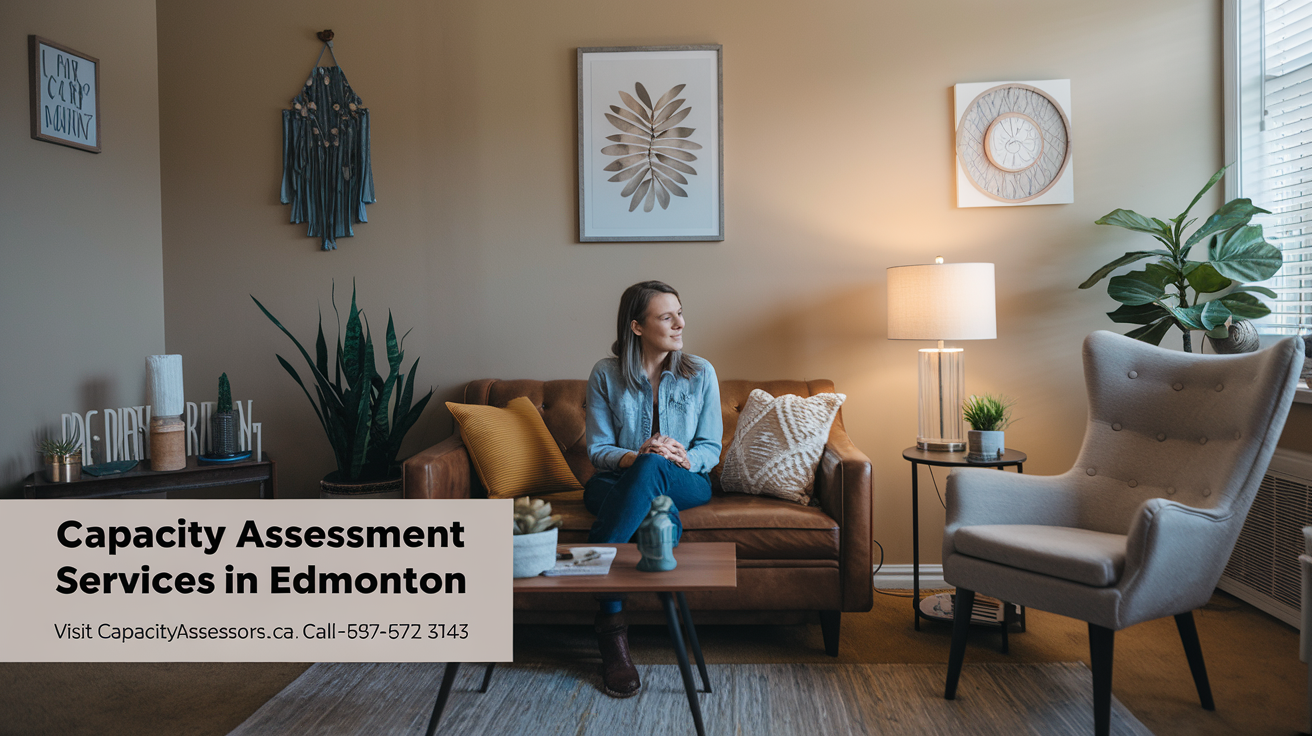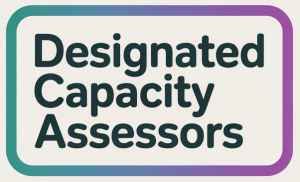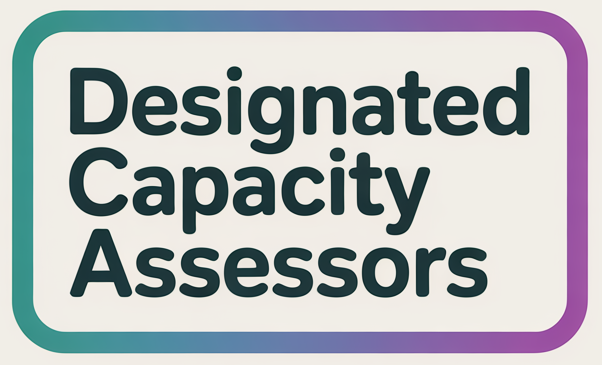Inside the Process: Capacity Assessment for Guardianship in Alberta

Picture this: years ago, I got a call from a friend in a bit of a panic. His aging aunt, sharp as ever, was suddenly struggling with her bills and paperwork. Despite his good intentions, he wasn’t sure if taking legal steps—like applying for guardianship—was the right thing to do. That’s when I first heard about capacity assessments. Honest moment: I had no idea how complex (or personal!) the process could be. If you’ve ever wondered if a loved one really needs help managing their affairs—or if you’re just plain lost in legal red tape—this post is for you. Let’s untangle the realities (and some surprises) of capacity assessment, right here in Alberta.
The Heart Behind Capacity Assessment: Real Lives, Real Impact
When you hear “capacity assessment,” you might think of paperwork and legal procedures. But here’s the reality: capacity assessment is fundamentally about protecting real people during their most vulnerable moments. It’s about ensuring that when someone can no longer make decisions for themselves, their rights and dignity remain intact.
Picture this scenario. Your elderly mother begins showing signs of confusion. She’s forgetting to pay bills, making unusual purchases, or agreeing to things that don’t align with her values. This isn’t just about cognitive decline—it’s about safeguarding her autonomy while ensuring she receives the protection she needs.
Why Capacity Assessment Matters for Families
The Adult Guardianship and Trusteeship Act (AGTA) provides the legal framework for capacity assessment in Alberta, but behind every assessment is a family navigating difficult decisions. Research shows that capacity assessments are guided by the AGTA, emphasizing legal and ethical safeguards while centering the process on the individual’s autonomy and rights.
Consider Sarah, whose father developed dementia. Without a proper guardianship capacity assessment, family members disagreed about his care. The capacity assessment didn’t just determine his decision-making abilities—it provided a roadmap for protecting his best interests while respecting his remaining autonomy.
“Capacity assessment is about dignity, not just decisions.” – Mukesh Mishra
Beyond Cognitive Testing: Context Matters
Here’s what many people don’t understand: capacity isn’t black and white. A person might struggle with complex financial decisions but still express clear preferences about their daily care. Capacity assessment benefits include recognizing these nuances. Context, personal history, and individual values all play crucial roles in the evaluation process.
The assessment considers not just what someone can decide, but how they make decisions. Does the person understand information relevant to their situation? Can they appreciate the consequences of their choices? These aren’t simple yes-or-no questions—they require careful, compassionate evaluation.
The Human Element in Professional Assessment
Not all assessments are created equal. When you’re facing these challenges in the greater Edmonton area—whether in Sherwood Park, Fort Saskatchewan, Leduc, Wetaskiwin, Camrose, or surrounding communities—having local, qualified support makes a significant difference.
Designated Capacity Assessors (DCAs) like Mukesh Mishra, an RCSW MSW therapist with DCA status, understand that each assessment affects real families. They conduct evaluations with both professional expertise and human compassion, often providing in-home assessments to ensure comfort and familiarity for the person being evaluated.
Imagine if your own family faced this situation tomorrow. What questions would you have? How would you want your loved one treated? These aren’t abstract legal procedures—they’re deeply personal processes that require skilled professionals who understand both the legal requirements and the human impact of their work.
The process centered on individual autonomy ensures that even when guardianship becomes necessary, the person’s voice and preferences remain central to all decisions made on their behalf.
Who Can You Trust? The Role of Designated Capacity Assessors
When you’re facing the complex world of capacity assessments in Alberta, you need someone who understands both the legal requirements and the human side of the process. Designated Capacity Assessors (DCAs) are specially certified professionals who bridge this gap, offering expertise that goes beyond what general healthcare providers can deliver.
What Makes a Designated Capacity Assessor Different?
Not every professional can conduct legal capacity assessments. Capacity Assessors Alberta must hold specific DCA certification, which authorizes them to perform these evaluations under the Adult Guardianship and Trusteeship Act. Research shows that DCAs are certified to perform legal capacity assessments and often offer in-home evaluations, making the process more accessible and comfortable for everyone involved.
Meet Mukesh Mishra: Your Local Expert
At capacityassessors.ca, you’ll find professionals like Mukesh Mishra, who brings an RCSW MSW Therapist DCA Status to his practice. His credentials include both Registered Clinical Social Worker (RCSW) and Master of Social Work (MSW) qualifications, combined with designated capacity assessor certification. This combination means you’re getting someone who understands both the clinical and legal aspects of capacity assessment.
“Effective capacity assessment starts with listening to the person, not just checking boxes.” – Mukesh Mishra
This approach reflects what sets quality Capacity Assessment Services apart – the focus on the individual rather than just meeting procedural requirements.
Finding the Right Assessor in Your Community
Location matters when you’re dealing with capacity assessments. The greater Edmonton area is well-served by qualified professionals covering communities like:
- Sherwood Park and Fort Saskatchewan
- Leduc and Wetaskiwin
- Camrose and Redwater
- Devon, Spruce Grove, and Stony Plain
- Gibbons and surrounding areas
Having local assessors means they understand your community’s unique characteristics and can provide more personalized service.
Streamlined Booking Process
Capacity Assessment Appointment Booking doesn’t have to be complicated. Through capacityassessors.ca, you can schedule your assessment online or call 587-372-3143 directly. The process eliminates the usual bureaucratic hurdles, connecting you with certified professionals quickly.
In-Home vs. Office Assessments
One significant advantage of working with qualified DCAs is flexibility in assessment location. Many assessors offer in-home evaluations, which can be particularly valuable when the person being assessed feels more comfortable in familiar surroundings. This option reduces stress and can lead to more accurate assessments since the individual isn’t dealing with the anxiety of an unfamiliar environment.
The choice between in-home and office assessments depends on individual circumstances, but having both options available demonstrates the person-centered approach that quality capacity assessment services should provide.
When choosing a Designated Capacity Assessor, look for professionals who prioritize clear communication, show empathy throughout the process, and understand that capacity assessments are about protecting rights while ensuring appropriate support is in place.
What’s Involved? Your Unfiltered Guide to the Capacity Assessment Process
Let’s be honest—no two capacity assessments are identical. Each person’s situation is unique, and the approach depends on factors like health conditions, family dynamics, and specific concerns about decision-making abilities. What might take two hours for one person could require multiple visits for another.
The Step-by-Step Capacity Assessment Process
The process begins with a referral, often from family members, healthcare providers, or legal representatives. Before any formal evaluation, your Designated Capacity Assessor conducts pre-assessment conversations. This isn’t paperwork for the sake of paperwork—it’s about gathering background information from family and stakeholders to understand the full picture.
Next comes the actual assessment phase. This involves structured interviews, direct observation, and sometimes cognitive testing. The assessor evaluates decision-making abilities across different areas—financial decisions, personal care choices, and healthcare decisions. Each component feeds into the final Capacity Assessment Report, which becomes crucial for any court applications.
Your Voice Matters: Family and Stakeholder Input
Here’s something many people don’t realize—your input as a family member or caregiver carries significant weight. Assessors actively seek perspectives from those who know the person best. You might share observations about daily functioning, changes in behavior, or concerns that prompted the assessment request.
The documentation process involves legal forms that might seem overwhelming, but qualified assessors like Mukesh Mishra explain everything in plain English. No legal jargon that leaves you scratching your head.
What to Expect During In-Home Evaluations
In-home evaluations offer a more comfortable alternative to clinical settings. Picture this: you’re sitting in your familiar living room, maybe with your dog at your feet, having what feels like a structured conversation rather than a formal examination. The assessor observes how you navigate your home environment, interact with family members, and handle everyday tasks.
These evaluations are particularly valuable because they show real-world functioning. How someone manages in their own space often differs from their performance in an unfamiliar office setting.
Debunking Common Myths
Does having a bad day mean someone lacks capacity? Absolutely not. Assessors understand that everyone has off days, and they’re trained to distinguish between temporary difficulties and genuine capacity concerns. The evaluation considers patterns over time, not isolated incidents.
“A compassionate assessment can relieve family tension and bring peace of mind.” – Mukesh Mishra
Understanding Capacity Assessment Fees
Capacity Assessment Fees typically range from $500-700 for guardianship and/or trusteeship evaluations. Extra travel fees may apply for remote locations, but many assessors serve the greater Edmonton area including Sherwood Park, Fort Saskatchewan, Leduc, Wetaskiwin, and Camrose.
Ready to move forward? Capacity Assessment Appointment Booking is straightforward—visit capacityassessors.ca or call 587-372-3143. The process ensures legal compliance while addressing individual needs with dignity and respect.
.png)
The Human Touch: Why Empathy Matters in Capacity Assessments
When you’re facing a Capacity Assessment Edmonton for guardianship, you’re not just going through a clinical evaluation. You’re entering a deeply personal process that requires genuine human connection and understanding. The difference between a checklist-driven assessment and one guided by empathy can fundamentally change the outcome.
Beyond the Checklist: Understanding Individual Needs
Capacity is nuanced—social workers who connect with clients make a difference. Every person has unique communication styles, personal preferences, and life experiences that shape how they express their thoughts and feelings. A truly effective Patient-centred Approach recognizes these individual differences and adapts accordingly.
Research shows that empathetic, patient-focused evaluations lead to better outcomes for all involved. When assessors take time to understand your loved one’s world, they can better evaluate their true capacity for decision-making. This isn’t about lowering standards—it’s about ensuring accuracy through genuine understanding.
Consider this real-life example: an assessor once overlooked a client’s deep love of gardening during an evaluation. This seemingly small detail actually revealed significant cognitive abilities and personal autonomy that changed the assessment results. The client’s ability to plan, nurture, and maintain a garden demonstrated executive functioning that wasn’t captured in standard questioning.
The Power of Professional Expertise Combined with Human Understanding
Mukesh Mishra’s DCA status and background as an RCSW MSW therapist shape his approach to Capacity Assessment Support Services. His dual expertise in social work and designated capacity assessment creates a unique blend of clinical knowledge and human-centered care. This combination allows for assessments that are both legally sound and deeply respectful of individual dignity.
“There’s no substitute for human understanding when making these life-changing recommendations.” – Mukesh Mishra
Think about it this way: imagine explaining guardianship to a beloved grandparent. What would you say? How would you ensure they felt heard, respected, and understood? This perspective shift illustrates why empathy matters so profoundly in capacity assessments.
Building Trust Through Respect and Confidentiality
Confidentiality and trust form the foundations for honest conversations during capacity assessments. When you feel safe and respected, you’re more likely to express your true thoughts and feelings. This authentic communication is essential for accurate assessment outcomes.
A patient-centred approach respects autonomy, wishes, and communication needs throughout the entire process. This means taking time to understand how someone prefers to communicate, what matters most to them, and what their daily routines look like. These details aren’t just background information—they’re crucial elements that inform the assessment.
The Capacity Assessment Benefits of this empathetic approach extend beyond the immediate evaluation. When assessments are conducted with genuine care and understanding, families feel more confident in the process and outcomes. This trust is especially important when dealing with sensitive decisions about guardianship and future care.
For those seeking capacity assessment services in Edmonton, Sherwood Park, Fort Saskatchewan, Leduc, Wetaskiwin, Camrose, and surrounding areas, you can book an appointment at capacityassessors.ca/book-appointment-for-capacity-assessment/ or call 587-372-3143.
Practical Realities: Costs, Locations, and Making It Happen
Understanding Capacity Assessment Fees
When you’re facing the need for a capacity assessment, one of your first questions is likely about cost. The good news is that Capacity Assessment Fees are transparent and straightforward. A basic assessment typically costs $500, while a combined guardianship and trusteeship evaluation runs $700. These fees reflect the comprehensive nature of the evaluation process and the expertise of designated capacity assessors like Mukesh Mishra, an RCSW MSW therapist with DCA status.
“It’s not about finding the cheapest option. It’s about finding the right fit for your family’s needs.” – Mukesh Mishra
Research shows that transparent pricing and local availability make the process accessible for families across Alberta. You won’t encounter hidden fees or surprise charges—just clear, upfront pricing that lets you plan accordingly.
Comprehensive Service Coverage Across Greater Edmonton Area
Finding Capacity Assessment Services Sherwood Park and surrounding areas has never been easier. The service network extends far beyond Edmonton’s city limits, reaching communities like Fort Saskatchewan, Leduc, Wetaskiwin, Camrose, Red Water, Devon, Spruce Grove, Stony Plain, and Gibbons.
Whether you need Capacity Assessment Fort Saskatchewan services or Capacity Assessment Leduc Wetaskiwin Camrose coverage, designated capacity assessors are available throughout the region. This extensive coverage means you don’t have to travel far from home during an already stressful time.
Booking Options That Work for Busy Families
You have two convenient ways to schedule your assessment. Online booking through https://capacityassessors.ca/book-appointment-for-capacity-assessment/ works well for families who prefer to handle arrangements at their own pace. Alternatively, calling 587-372-3143 connects you directly with assessment coordinators who can answer questions and schedule appointments immediately.
Some families find phone calls more reassuring, especially when they need to discuss specific circumstances or ask detailed questions about the process.
Flexible Assessment Locations
You’re not limited to office visits. Assessments can be conducted at your loved one’s home or care facility, which often provides a more comfortable environment for the person being evaluated. This flexibility is particularly valuable when dealing with individuals who may feel anxious in unfamiliar settings.
Travel Fees and Additional Costs
While Capacity Assessment Greater Edmonton Area services cover a wide region, travel fees may apply for locations outside core service areas. These charges are clearly explained upfront, so you’ll know exactly what to expect before scheduling.
Proactive Planning Saves Stress
Don’t wait for a crisis to arrange a capacity assessment. Planning ahead reduces stress and ensures you have time to understand the process thoroughly. Early planning also gives you flexibility in scheduling and reduces the emotional pressure of making decisions during emergencies.
To book a capacity assessment or inquire about costs, visit capacityassessors.ca or call 587-372-3143 today.
When Families Disagree: Navigating Tough Conversations Around Guardianship
Family disagreements about guardianship decisions can turn an already difficult situation into an emotional battlefield. You might find yourself caught between siblings who have different opinions about what’s best for your loved one, or facing resistance from family members who don’t understand why a Guardianship Capacity Assessment is necessary.
Why Families Clash Over Guardianship
Common reasons for family conflicts include disagreements about the person’s actual capacity, concerns about who should become the guardian, and different interpretations of what the person would have wanted. Sometimes, one family member has been the primary caregiver and feels their opinion should carry more weight. Other times, geographic distance creates tension when out-of-town relatives question local decisions.
Financial concerns often fuel these disagreements. When significant assets are involved, family members may worry about how guardianship will affect inheritance or suspect ulterior motives. These conversations become even more challenging when the person being assessed has moments of clarity mixed with periods of confusion.
Strategies for Respectful Dialogue
When discussing guardianship with family members, focus on your loved one’s needs rather than personal preferences. Avoid phrases like “I know what’s best” or “You don’t understand the situation.” Instead, use collaborative language such as “Let’s consider what would help them most” or “What do you think they would want?”
Listen actively to other family members’ concerns. Their resistance might stem from fear, grief, or feeling excluded from important decisions. Creating space for these emotions can help move conversations forward constructively.
The Role of Professional Capacity Assessment Support Services
This is where Local Capacity Assessors become invaluable. A designated capacity assessor doesn’t take sides in family disputes but provides an objective, professional evaluation. They serve as neutral mediators who help families communicate more clearly during disagreements.
“An assessor’s job is to honor the person’s wishes while keeping peace in the family.” – Mukesh Mishra
Professional assessors like those at capacityassessors.ca understand that impartiality protects everyone involved. Their involvement doesn’t mean taking sides but rather ensuring the assessment process remains focused on the person’s actual capacity and best interests.
The Value of Outside Perspective
When families are emotionally invested in the outcome, an outside professional can see things more clearly. RCSW MSW therapists with DCA status, such as Mukesh Mishra, bring both clinical expertise and legal knowledge to these complex situations. They can help families in the greater Edmonton area, including Sherwood Park, Fort Saskatchewan, Leduc, and surrounding communities, navigate these difficult conversations.
Many families later express relief at having professional guidance. The structured assessment process often reveals that the best outcome wasn’t what anyone initially expected. Sometimes the person has more capacity than family members realized, or the assessment identifies specific areas where support is needed while preserving independence in others.
If your family is facing these challenges, consider Capacity Assessment Appointment Booking at https://capacityassessors.ca/book-appointment-for-capacity-assessment/ or call 587-372-3143. Professional mediation can transform family conflict into collaborative problem-solving.
Next Steps: How to Book and What to Expect After the Assessment
Taking the next step in your capacity assessment journey doesn’t have to feel overwhelming. Research shows that easy booking and aftercare reduce stress for families navigating capacity concerns, and at capacityassessors.ca, we’ve streamlined the entire process to support you every step of the way.
Simple Capacity Assessment Appointment Booking
Getting started is straightforward. You have two convenient options for Capacity Assessment Appointment Booking: visit our online booking system at capacityassessors.ca/book-appointment-for-capacity-assessment/ or simply call 587-372-3143. Whether you prefer the convenience of online scheduling or want to speak directly with our team, we’re here to accommodate your needs.
Our phone consultations allow you to ask questions upfront, while our email guidance ensures you have all the information needed before your appointment. This flexibility means you can choose the communication method that works best for your family’s situation.
What Happens After Your Assessment
Once your capacity assessment is complete, you’ll receive a comprehensive Capacity Assessment Report that details the findings. This isn’t just a piece of paper—it’s a crucial legal document that will guide the next steps in your guardianship proceedings. The report delivery process is handled professionally, ensuring you understand every aspect of the assessment results.
Follow-up appointments may be necessary depending on the findings, and our team will clearly explain any next legal steps required. You’re not left to navigate this complex process alone.
Documentation and Record Keeping
Here’s something important to know: you keep the documentation. The capacity assessment report belongs to you and your family, giving you control over this sensitive information. This documentation becomes part of your legal proceedings and should be stored safely for future reference.
Ongoing Capacity Assessment Support Services
Mukesh Mishra Capacity Assessment Services extends beyond the initial evaluation. Our aftercare program provides ongoing support and advice as you navigate the legal system. Whether you have questions about the report or need guidance on next steps, our team remains available.
“We’re here for you—before, during, and after the assessment.” – Mukesh Mishra
Sometimes, families receive unexpected good news. Imagine discovering that your loved one’s autonomy can be protected through less restrictive measures than full guardianship. An objective assessment can reveal capabilities that weren’t immediately apparent, leading to outcomes that preserve independence while ensuring safety.
Quick Access to Resources
For urgent questions or additional resources, our team serving the greater Edmonton area—including Sherwood Park, Fort Saskatchewan, Leduc, Wetaskiwin, Camrose, and surrounding communities—is just a phone call away. Don’t hesitate to reach out when you need support.
The capacity assessment process represents a significant step in protecting your loved one’s best interests. With professional guidance, clear communication, and comprehensive support, you can navigate this journey with confidence, knowing that every decision is made with care and legal precision.
TL;DR: Capacity assessment for guardianship is about more than ticking boxes—it’s about protecting individuals with compassion and expertise. In Alberta’s greater Edmonton area, capacityassessors.ca and professionals like Mukesh Mishra, RCSW MSW DCA, offer thorough, person-centered support. Book online or call 587-372-3143 for personal guidance.
Share this :

We provide Capacity Assessment Service in Greater Edmonton Area and 1-2 hrs driving distance from Edmonton .






